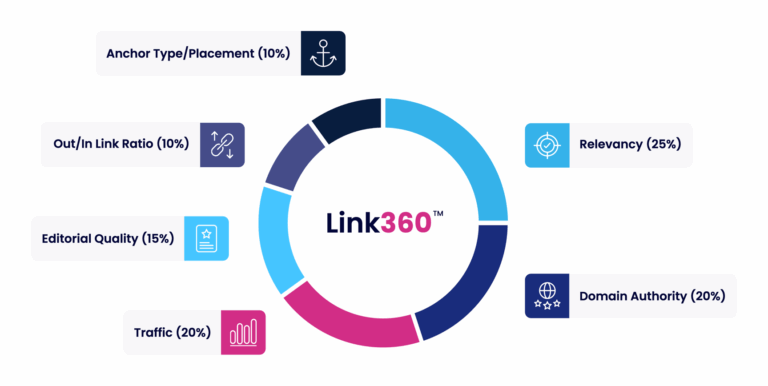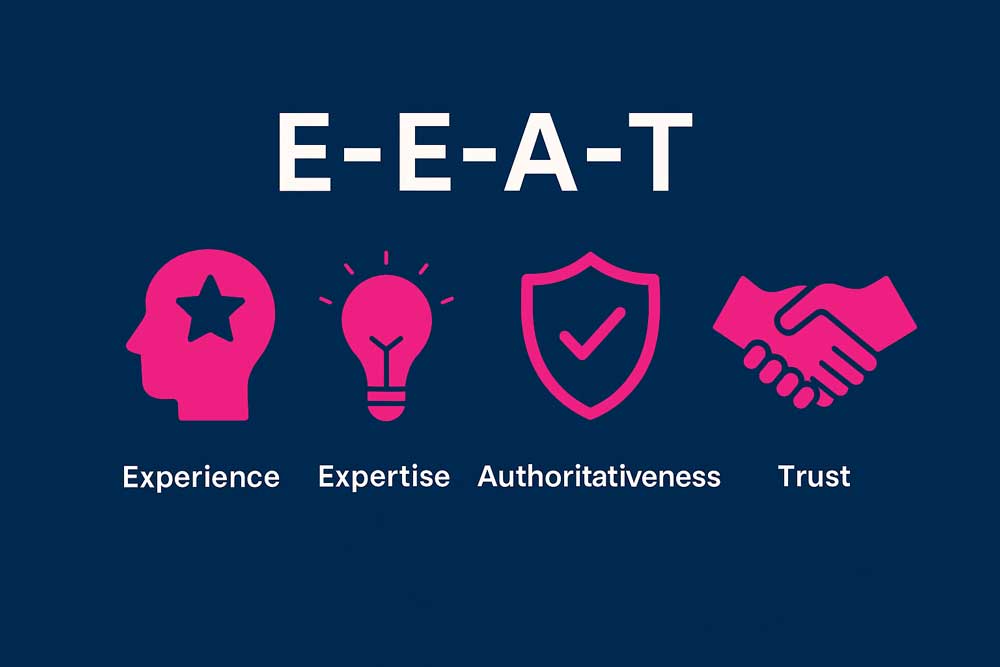
If you want to rank in Google – and build trust with the people reading your content – you need to understand “EEAT”.
Short for Experience, Expertise, Authoritativeness and Trustworthiness, EEAT is Google’s framework for evaluating content quality. It helps the search engine decide whether your content deserves to show up in the results – especially when users are searching for something that could impact their health, finances, or well-being.
But EEAT isn’t just about SEO (search engine optimisation). It’s also about your readers. In an age of misinformation and AI-generated everything, audiences are becoming more selective. They want content they can rely on – from brands they can trust.
This is why EEAT matters for both Google and users. It helps improve search visibility, but it also plays a crucial role in turning visitors into customers.
In this blog, we’ll explore what EEAT really means and why it’s so important, as well as sharing practical insider tips on how to bake it into your content.
What is EEAT?
EEAT stands for Experience, Expertise, Authoritativeness and Trustworthiness. It isn’t a direct ranking factor in the way keywords or backlinks are, but it does play a big role in how Google evaluates the quality of your content.
Originally introduced as E-A-T in Google’s Search Quality Evaluator Guidelines, it was updated in 2022 to include a second E — for Experience. Why? Because Google realised that first-hand knowledge matters. Readers don’t just want facts – they want insights from someone who has actually been there and done it.
Let’s take a closer look:
💼 Experience: Has the content been written or reviewed by someone with real, hands-on involvement in the topic?
🎓 Expertise: Does the author know their stuff, and can they demonstrate it with facts, credentials or clear insight?
💡 Authoritativeness: Is the website known and trusted in its field? Do others reference it or link back to it?
🔐 Trustworthiness: Is the information reliable, accurate and safe to act on?
These signals help Google decide if your website deserves to rank. And whilst they’re especially important in sensitive or high-stakes sectors like healthcare, finance, or legal, they’re definitely not limited to those.
The best part is that when you focus on EEAT, you’re not just helping your search rankings. You’re giving your audience a better experience into the bargain – which means more engagement, more loyalty – and an improved chance of converting visitors into leads.
Why is EEAT vital for SEO?
EEAT isn’t a direct ranking factor in the sense of having a specific algorithm score. But Google has confirmed that EEAT is part of its Search Quality Rater Guidelines – the internal document used by real human evaluators to assess the quality of search results. That means it heavily influences the direction of algorithm updates.
Why does it matter?
Because Google’s mission is to deliver reliable, helpful information. If your website shows clear signs of experience, expertise, authority and trust, Google is far more likely to prioritise it in the search results.
EEAT has become particularly important in industries where bad information can cause real harm. Think healthcare, financial advice, legal services, education – anything that affects someone’s well-being, finances or safety.
Google even has a name for these types of sites: YMYL (Your Money or Your Life). We’ll cover that later, but for now the key point is this: the higher the stakes, the higher the standard.
If your content lacks credibility, it’s not just a missed opportunity. It could actively harm your rankings – especially if your competitors are nailing it.
Why EEAT matters for users too (not just Google)
It’s easy to think of EEAT as something that only matters to Google. But it’s also about the users – the real people who are searching for answers, guidance and reassurance.
When your content demonstrates first-hand experience, genuine expertise, a visible reputation and clear trust signals, it does more than just tick boxes. It builds confidence.
💡 Think about your ideal client, customer or patient…
If they’re choosing a private clinic, do they want vague advice written – or insights from a named specialist?
If they’re researching retirement planning, are they looking for generic tips – or a step-by-step guide written by someone who does this for a living?
If they’re planning on buying a property, would they prefer recycled copy – or insider knowledge from an agent who knows the local area like the back of their hand?
EEAT helps answer the key question every visitor asks – “Why should I trust this?”
When you get EEAT right, you’re not just improving your chances of ranking. You’re more likely to convert readers into leads, build loyalty, and differentiate yourself in a crowded market.
It’s all about reassuring users that you know your stuff, and that you’re someone worth doing business with.
💡 Practical tips: how to bake EEAT into your content
So what exactly is Google looking for when it talks about EEAT? Here’s a quick run-through of each element, why it matters and how to show it in your content.
💼 Experience
“First-hand insight – showing you’ve been there”
This is all about first-hand involvement. Google wants to see that the content has been written by someone who’s actually done the thing they’re talking about.
First-hand experience is one of the strongest trust signals Google looks for, so you’re looking to create material that’s grounded in real-life knowledge, not guesswork or second-hand summaries.
Content examples:
- A healthcare article that draws on interviews with real clinicians
- A travel guide based on personal visits and recommendations
- A property page written with local insight and first-hand tips
Visual aspects – what to back your words up with:
✅ Behind-the-scenes photos (e.g. in clinic, on-site, meeting clients)
✅ Real client journeys or case studies, showing outcomes over time
📍 Location-specific insights that prove you’ve worked in that sector or visited that area
Example: On the Figment home page, we have included real-life photos of our team meeting with clients, client testimonials and links to case studies showcasing our work.
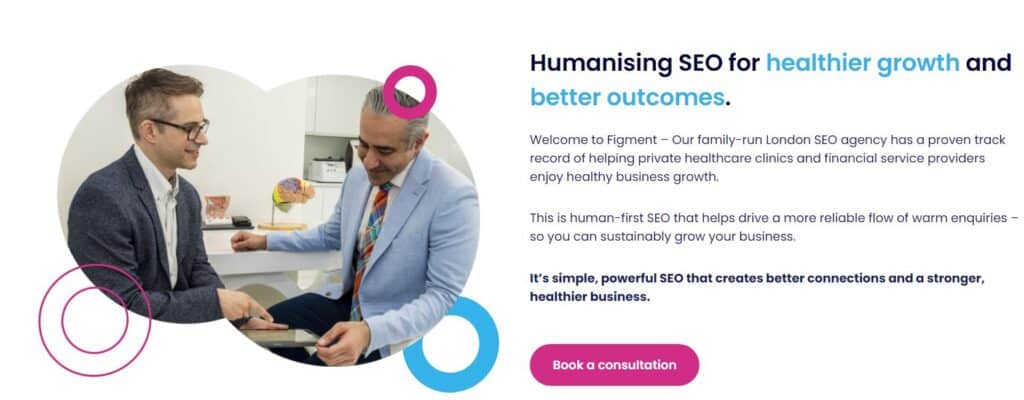
🎓 Expertise
“Knowledge, credentials, qualifications – proving you know your stuff”
Expertise means your content comes from someone who actually knows the topic – ideally with credentials to match.
In sectors like healthcare, finance or law, this means having content written or reviewed by qualified professionals. But in any industry, it’s about demonstrating depth of knowledge, not just surface-level tips.
How to approach your content:
✅ Include expert quotes, annotated with a name, title and biography link
✅ Use accurate, up-to-date information – and cite your sources
✅ Link to recognised bodies where relevant, for example:
- NHS or NICE for healthcare content
- HMRC or Financial Conduct Authority (FCA) for finance
- Law Society or Solicitors Regulation Authority (SRA) for law
- Land Registry or GOV.UK for property and planning regulations
Visual aspects – what to back your words up with:
👨⚕️ Expert author biographies
📄 Qualifications, memberships and accreditations – clearly listed
💡 Authoritativeness
“Industry reputation – being recognised in your space”
Authority means being recognised as a credible source in your space. It’s not just about what you say – it’s about what others say about you too.
How to approach your content:
✅ Include an author biography link to explain who wrote the content and why they’re qualified to talk about it
✅ Only share content that consistently aligns with your niche area of expertise
Visual aspects – what to back your words up with:
✅ List any media mentions (“As featured in”) – e.g. BBC, Financial Times, etc.
✅ Include industry association logos, e.g. FCA, Law Society, Propertymark
✅ Showcase awards or other industry accolades
✅ Highlight client testimonials and reviews from trusted platforms (e.g. Google, Trustpilot)
And from a technical point of view, you should be using:
- Structured data – behind-the-scenes code that helps Google understand what your content is about (this will help highlight product reviews, events, FAQs, etc.).
- Internal linking – linking to relevant useful pages on your site, which also helps search engines understand your content better.
Example: On the Figment About Us page, we’ve featured our industry awards, and on our home page, we’ve listed the authority publications in which we’ve been featured, as well as showcasing client testimonials – and our Google review score right at the top of the page.
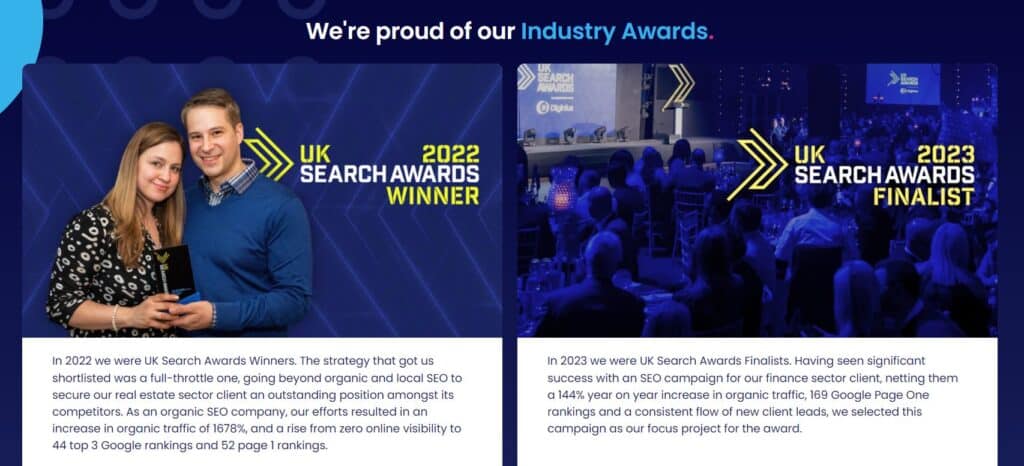
🔐 Trustworthiness
“Accuracy, transparency, honesty – making people feel safe”
Trust is the foundation of all good content, and it’s earned through transparency, clarity and security.
How to approach your content:
✅ Use clear, transparent language – be sure to explain any technical terms in plain English to suit the knowledge level of your audience
✅ Back up claims with reliable data – and clearly link to the “primary sources” to show where you got the information from – ALWAYS avoid vague or unverified claims
✅ Avoid “clickbait” or exaggerated promises
Visual aspects – what to back your words up with:
🔐 Secure site badge (HTTPS padlock)
📄 Privacy policy and cookie consent
📍 Clear contact info and named team members
🎯 A “Primary Source” is the original publisher of a fact, figure or quote — not a blog that’s repeating it. Linking to the first-hand source (like NHS guidance, an official government site or a published research paper) boosts credibility and shows Google you’ve done your homework.
👉 If you’re writing about sensitive topics such as like health, finance or legal matters, trust becomes even more important. Google knows the risks of misinformation in these areas, so it holds content to a much higher standard.
EEAT and YMYL – Is EEAT just for regulated industries?
You’ll often hear EEAT mentioned alongside a term that sounds like it belongs in a crime drama: YMYL – short for Your Money or Your Life.
This is how Google classifies content that could directly impact a person’s health, finances, safety, or overall wellbeing. So we’re talking about pages related to:
- Healthcare, medical advice and treatments
- Financial products and planning
- Legal guidance
- News and public policy
- Shopping or product reviews that influence major purchases
Because this content can shape serious decisions, Google holds it to a much higher standard. And rightly so. A misleading health article, or inaccurate investment guide, could do real harm. That’s why EEAT is crucial if your business operates in these spaces.
But EEAT isn’t just for regulated sectors.
Even if your business doesn’t fall under the YMYL umbrella, Google still wants to see that your site is helpful, honest and run by real people.
Whether you’re a furniture maker, a motorhome dealer or a wedding photographer – the more you can show experience, expertise, authority and trust, the better your chances of ranking well and converting clicks into clients.
In short:
🔎 If you want to be visible, EEAT matters.
💡 If you want to be trusted, EEAT is essential.
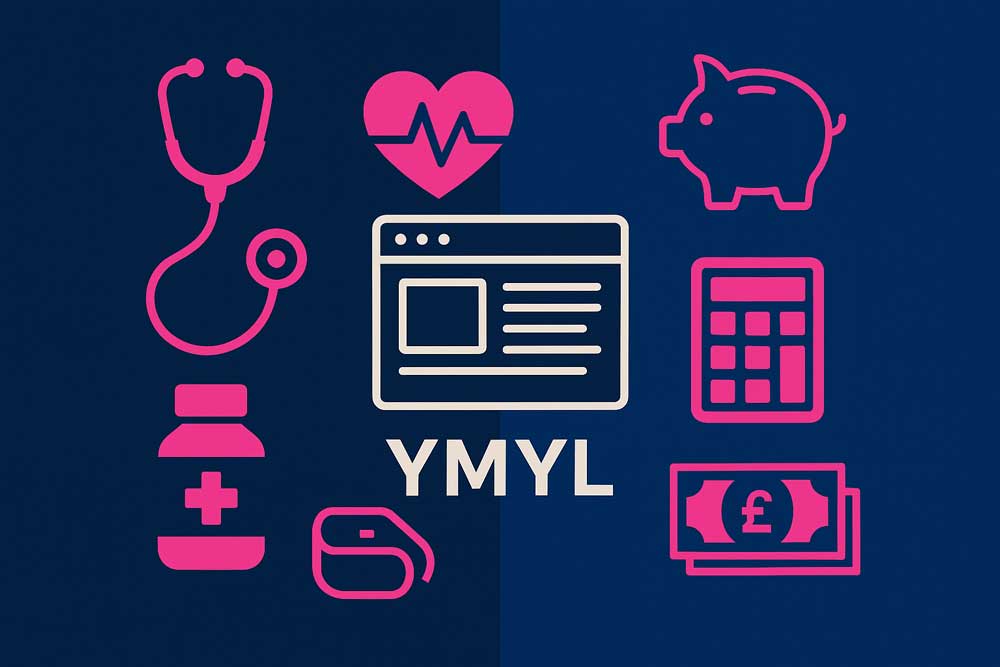
Figment’s approach to EEAT for SEO: How we help clients show they’re the real deal
At Figment, we don’t just talk about EEAT – we build it into everything we do.
Whether you’re a private clinic, a financial planner, a legal firm, a property specialist or any local business wanting to grow your online presence, we create content and SEO strategies that prove your expertise, authority and trust to both users and Google.
Here’s how we do it:
✅ Interview-led content, not guesswork
We regularly speak with our clients to get under the skin of their services. This helps us craft content that’s grounded in real-world experience – not surface-level fluff. Whether it’s a fertility consultant explaining treatment options, or a property developer discussing the latest local market trends, we bring unique insight to every article.
✅ Fact-checked, structured and cited
We cross-check every claim to within an inch of its life, and quote reliable sources throughout where relevant. From NHS guidelines and financial bodies to planning authorities and official data, we make sure our clients’ content is credible and clear.
✅ Smart internal linking and schema mark-up
Our technical SEO team works behind the scenes to build trust signals into your site structure. That means linking related pages in a helpful way, adding schema to highlight author bios, reviews and FAQs, and making sure Google can clearly understand what your site is about.
✅ A human tone and a reader-first approach
We always write with real people in mind – not just algorithms. That means no robotic copy, no generic advice, and no padding. Just genuinely helpful content that answers your audience’s questions and helps them make informed decisions.
Figment’s approach to EEAT isn’t about ticking boxes. It’s about helping good businesses stand out online for the right reasons and convert clicks into clients – because they are trustworthy, experienced, and genuinely useful.
💬 Want to dig deeper into how EEAT and content quality go hand in hand – especially in the age of AI?
Check out our article on Human vs AI-Generated Content: Which Performs Better? for more insights on how experience, empathy and subject expertise give human-written content the winning edge.
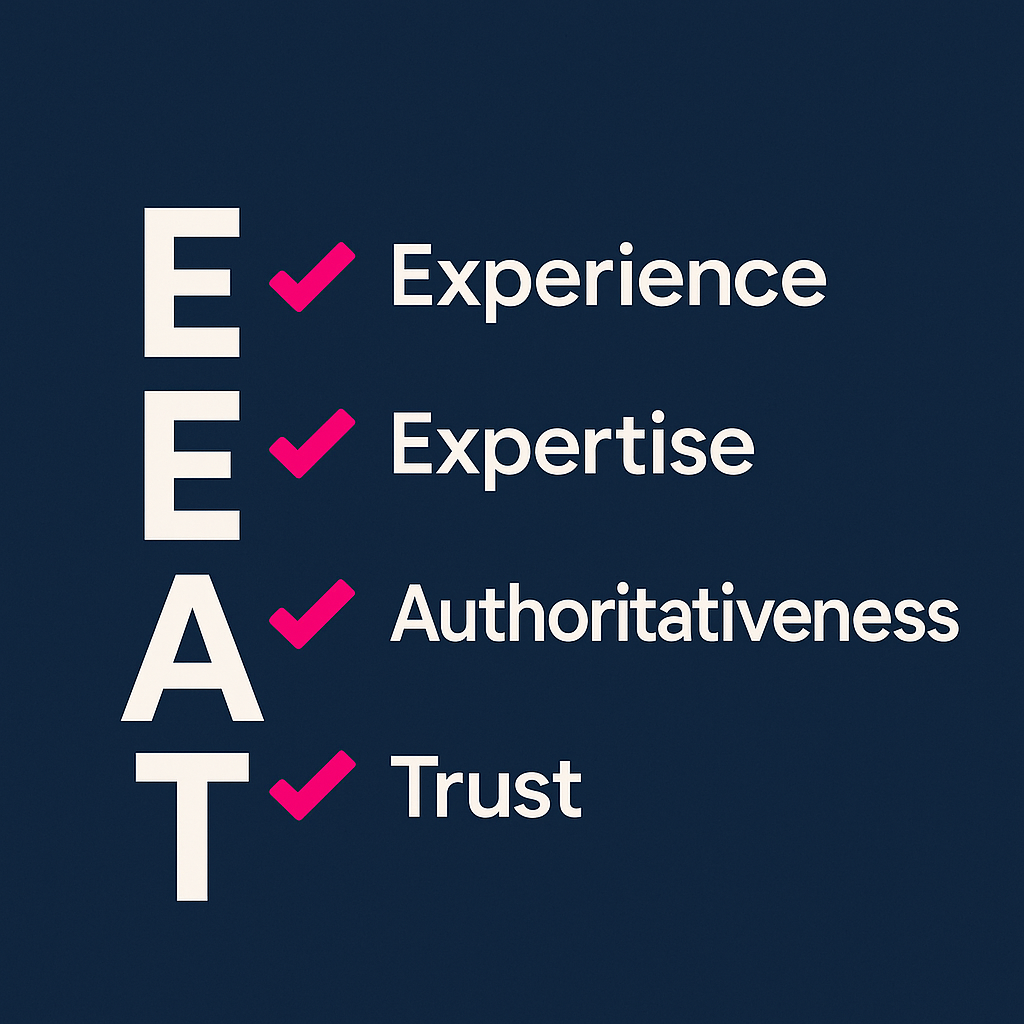
Final Thoughts: EEAT isn’t just a trend – it’s the future of search
Google’s priorities have shifted. It no longer just wants keyword-stuffed content or clever tricks. It wants to reward websites that genuinely help people.
That means content written by people with first-hand experience, backed by real expertise, positioned with authority, and delivered in a way that builds trust.
EEAT isn’t just important for SEO. It’s also vital for your audience. Because whether someone is choosing a clinic, a financial adviser or a business to work with, they want to feel confident they are making the right decision.
At Figment, EEAT is built into everything we do. We work with ambitious growing businesses across healthcare, finance, property and professional services to craft content and strategies that perform – not just for search engines, but for real people.
💡 Want to make sure your SEO strategy is EEAT-ready?
Let’s talk about how we can help you build trust, boost rankings and win over your audience with content that truly delivers.

